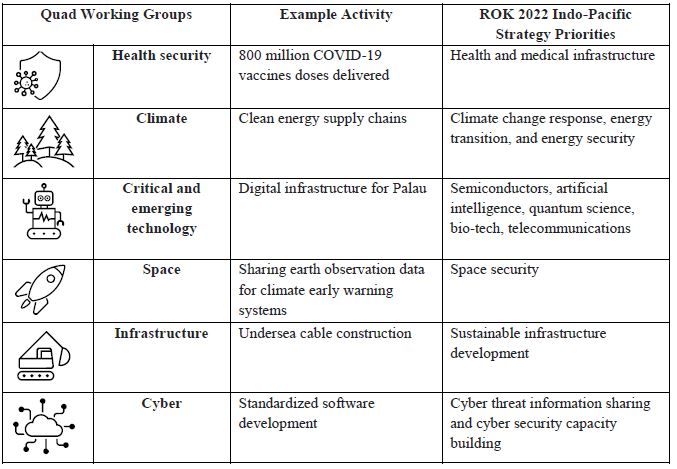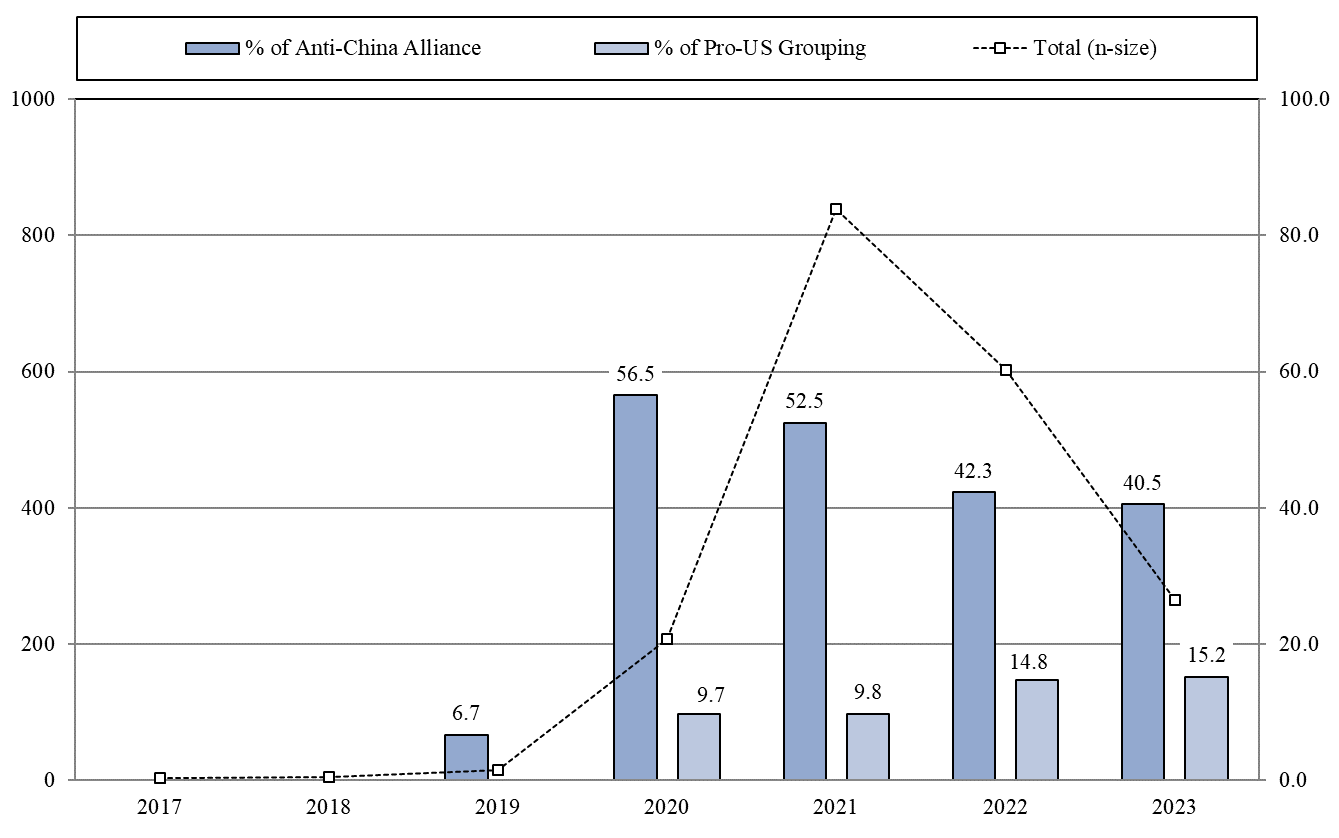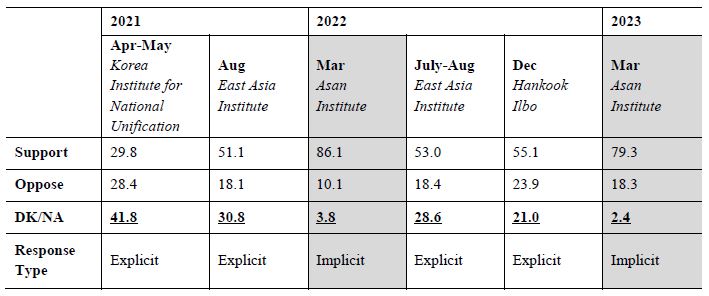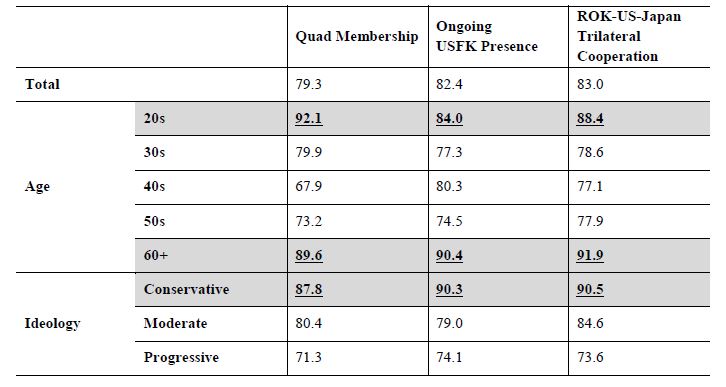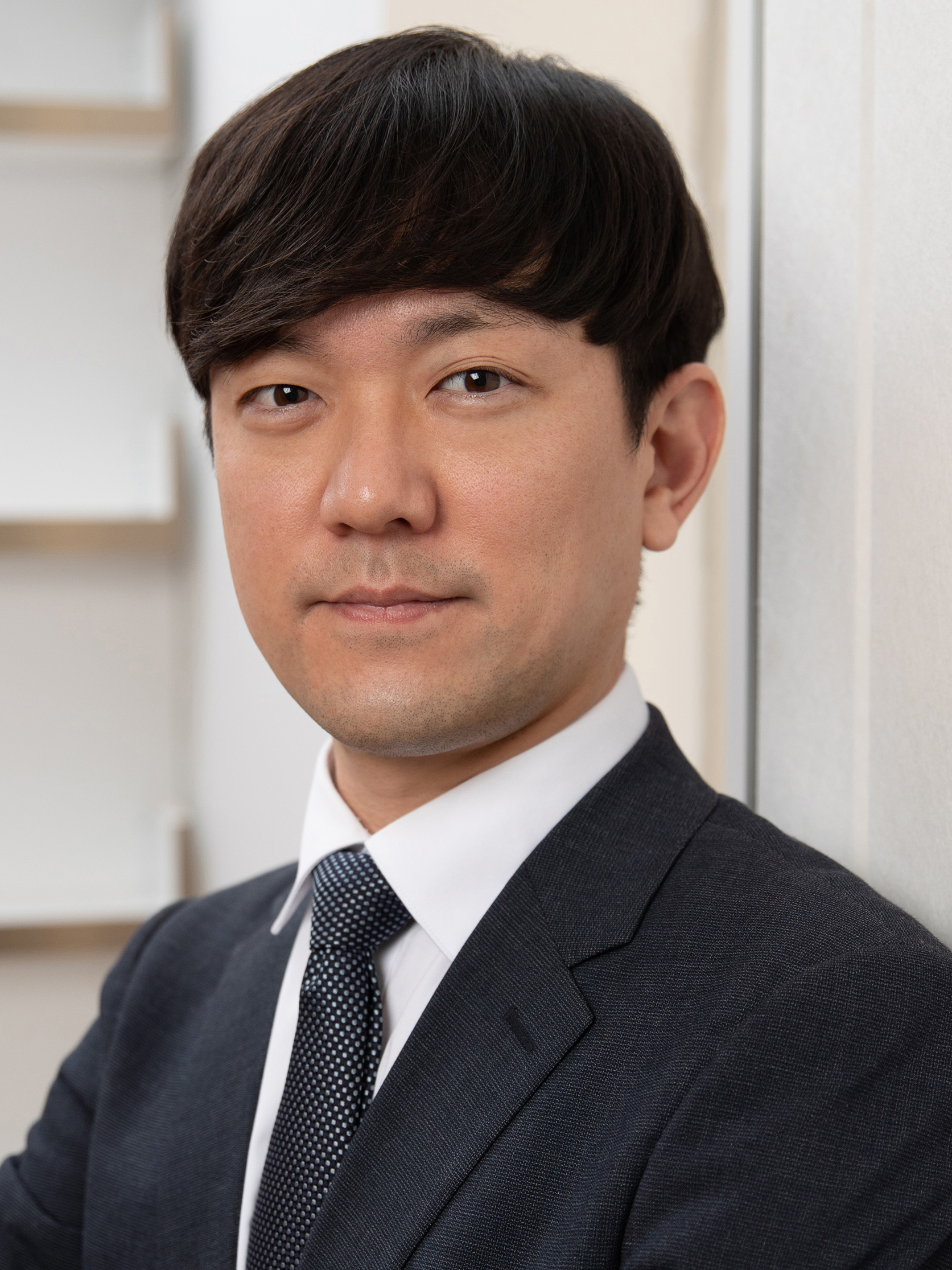Introduction
The Quadrilateral Security Dialogue (Quad) between the United States, Australia, India, and Japan has become one of the Indo-Pacific’s most prominent minilateral groupings. Ever since it was revived in 2017, there has been widespread misunderstanding about what the Quad is and also debate about whether or not South Korea should join it. The Quad countries emphasize the grouping’s “positive, practical agenda” in delivering regional public goods such as humanitarian aid, infrastructure, and vaccines.1 Meanwhile, China has criticized it as a de facto “military alliance.”2 The previous Moon Jae-in administration subsequently shunned the Quad due to sensitivities about provoking China. By contrast, the Yoon Suk Yeol administration has promised to work closely with, and potentially even join, the Quad as part of its Indo-Pacific Strategy and alliance solidarity with the United States.
Yet most public opinion surveys to date have found that only half of South Koreans support joining the Quad, while a third remain undecided, suggesting that the public has not formed a clear view about the grouping. This Asan Issue Brief argues that the South Korean public is, in fact, more positively disposed towards the Quad that is commonly acknowledged. It shows that a majority of “undecided” respondents found in most polls actually leans in favor of the Quad. When this ‘weak support’ is combined with those clearly in favor of the grouping, there is highly favorable support (79~80%) for South Korea cooperating with the Quad. The results suggest that there is broad public support for South Korean cooperation with not just the Quad but also other regional partnerships.
The Issue Brief proceeds as follows. First, it discusses growing South Korean public awareness of the Quad and changing government positions towards the grouping. Second, it reviews the results of Asan Institute polling that show significantly higher public support for the Quad than other surveys. Third, it examines whether negative views of the security environment and China, what we call the “fear factor,” or positive feelings towards US leadership and US-led initiatives, what we call the “alliance factor,” better fits with the demographic breakdown of Quad support. We find that South Korean support for the Quad runs contrary to a pessimistic strategic outlook and instead correlates with alliance solidarity.
We find that South Korean support for the Quad runs contrary to a pessimistic strategic outlook and instead correlates with alliance solidarity. |
Finally, we discuss the implications of these findings and recommend the Yoon administration seek bipartisan political support for the Quad. It should also launch a public awareness campaign about how the ROK Indo-Pacific Strategy aligns with the Quad’s agenda. The United States and Quad partners should explain the broader value of South Korea engaging with new partnerships such as the ROK-US-Japan Camp David partnership, the AP-4 NATO leaders’ dialogue, the Chip 4 grouping, and the AUKUS partnership. In the short term, South Korea should pursue practical cooperation with Quad working groups ahead of the 2024 US presidential election to safeguard against possible erosion of public support. South Korean public sentiment is currently an open door towards the Quad. South Korean governments have an opportunity to build public support towards minilateral partnerships as one pathway to strengthening the ROK-US alliance for an Indo-Pacific era.
The South Korean Government’s Changing Stance towards the Quad
Minilateral cooperation is accelerating amongst the Indo-Pacific’s liberal democracies. The northern anchor of these efforts is the Camp David summit between the United States, South Korea, and Japan while the southern anchor is the Australia-US-United Kingdom (AUKUS) trilateral partnership for the construction of conventionally-armed nuclear-powered submarines. Preceding both of these efforts has been the Quadrilateral Security Dialogue (Quad) between the United States, Australia, India, and Japan. The Quad proclaims itself to be “a diplomatic network of four democracies committed to supporting a free and open, stable and prosperous Indo-Pacific that is inclusive and resilient.”3
South Korea has long been recognized as a natural partner with the Quad’s regional public goods agenda.4 A potential ‘Quad Plus’ dialogue has also been welcomed by a growing number of partners, including in the US Congress.5 But whereas the main progressive and conservative political parties in the United States, Australia, India, and Japan have all come to a consensus on the value of the Quad, this is not the case in South Korea.6 For example, the Moon Jae-in administration and Democratic Party maintained that South Korea had never been invited to join the Quad and therefore refused to be drawn on what their view of the grouping was.7
By contrast, during the 2022 South Korean presidential election, then-candidate Yoon Suk Yeol of the conservative People Power Party (PPP) argued that “Seoul should willingly participate in Quadrilateral Security Dialogue working groups, consider joining multilateral regional cooperative initiatives in phases, and take part in trilateral security coordination with the United States and Japan.”8 Foreign Minister Park Jin similarly proposed the expansion of the Quad into a “Penta” in 2021.9 After winning the election, President Yoon’s first phone calls were with the leaders of the Quad countries.
While there was significant debate during the Moon Jae-in administration about whether South Korea should join the Quad, this has largely dissipated under the Yoon Suk Yeol administration, which has instead made strides on other minilateral partnerships such as the Camp David trilateral summit, Asia-Pacific 4 (AP4) partnership with the North Atlantic Treaty Organization, and the Chip 4 grouping on semiconductors. Nonetheless, the Quad remains a key minilateral grouping, especially for the United States, and therefore understanding public and political attitudes towards it is essential for South Korea’s long-term engagement with minilateral groupings in general.
As Table 1 illustrates, the Quad currently has six leader-level working groups on health security, climate, critical and emerging technology, space, infrastructure, and cyber, as well as official-level working groups on maritime security, counterterrorism, and humanitarian assistance and disaster relief. The Yoon administration’s 2022 Indo-Pacific Strategy identified “infectious disease, climate change, and emerging technologies” as the three Quad working groups where Korea could make the biggest contributions.10 There are also promising complementarities between other Quad initiatives as listed in Table 1. In short, the contributions that South Korea hopes to make in upholding a free, peaceful, and prosperous Indo-Pacific closely align with the action plan of the Quad countries.
Table 1. ROK Complementarities with Quad Leader-Level Working Groups11
Despite the Quad’s extensive agenda and regional profile, in South Korea, it is largely misunderstood. We compiled all newspaper articles, op-eds, and editorials which mentioned the Quad in the title or body text from South Korea’s ten largest newspapers between January 2017 and September 2023.12 As shown in Figure 1, the sample of 1,936 news articles shows that South Korean news coverage of the Quad only increased from 2020 (n=207) and peaked in 2021 (n=838). We found that 47.5% of news articles framed the Quad as an “anti-China” grouping or “security(military) alliance”, while only 11.9% included “pro-US” keywords. This suggests that the South Korean public has been given skewed information of what the Quad is.
Figure 1. South Korean Media Coverage of the Quad, 2017-2023
(Left: Number of Articles, Right: %)
Asan Polling and the “Soft-Yes” South Korean Public
If the South Korean political system is divided towards the Quad, this should be proportionately reflected in public sentiment, but it is not. For example, South Korean public attitudes towards many foreign policy issues fall along political orientations such as the deployment of the THAAD missile defense system (support 58.4%, oppose 38.4%) and approval of US global leadership (approve 42.8%, disapprove 55.8%).13 However, as Table 2 illustrates, Asan Institute polls in 2022 and 2023 found 86.1% and 79.3% of South Koreans support joining the Quad, respectively.14 This is substantially higher than the 50~55% support found in surveys by other South Korean organizations.
If the South Korean political system is divided towards the Quad, this should be proportionately reflected in public sentiment, but it is not. |
The methodological difference between the Asan Institute surveys and other polls is explained in Appendix 1. While a third of respondents were unopinionated when given the option of answering “don’t know” in other polls, we hypothesize that these people supported the Quad in the Asan Institute surveys in which a “don’t know” option was not explicitly offered.15 Put simply, the Asan polls were designed to explore the presence of a “soft-yes” or “soft-no” tendency if explicit options had not been offered. The comparison shown in Table 2 offers a valuable insight into how this group is leaning. This is a finding that has not been properly acknowledged in the debates about South Korean attitudes towards the Quad.
Table 2. South Korean Attitudes towards the Quad16 (%)
Explaining “Soft-Yes” Quad Support: Hostility towards China
South Koreans who view the current and future national security situation as positive showed much higher levels of support for the Quad. |
Given a majority of South Koreans lean in favor of joining the Quad to some degree, we wanted to explore what factors might explain this “soft-yes” support. There are many possible explanations, including a desire to contribute to regional public goods befitting South Korea’s status; closer affinity and sense of goodwill towards Australia, India, Japan, and the United States in recent years; and rising threat perceptions towards North Korea and a desire for international support. We only consider two of the most popular explanations while acknowledging that other factors may also exert an influence: negative views of the security environment as a proxy for the fear of China (“fear factor”), and positive sentiment towards the United States and US-led initiatives (“alliance factor”). These two factors are not mutually exclusive: a person may strongly support US alliance cooperation while simultaneously not want to join what they regard as an anti-China alliance, but they encapsulate the core competing arguments.
The first plausible explanation is that the Quad is associated with containment of China as widely reported in South Korean media (See Figure 1). From this perspective, any efforts to join the Quad would negatively affect South Korea-China relations and damage South Korea’s national interests. The Quad was revived in 2017 at the height of South Korea’s diplomatic crisis with China over the deployment of THAAD missile defense. South Korean negative attitudes towards China are now among one of the highest in the world, ranging between 75% and 80% since 2020.17 These figures closely fit those supportive of the Quad. Consequently, it is reasonable to conclude that high South Korean support for the Quad might be due to deteriorating views of China and a willingness to forcefully balance against China.18
To indirectly test the hypothesis, respondents who are more concerned about South Korea’s current and future national security situation, which is in response to a combination of perceived threats from China and North Korea, should be favorable towards the Quad. This explanation was found to be false. As shown in Table 3, it was in fact those who view the current and future national security situation as positive showed much higher levels of support for the Quad. Respectively, 91.1% and 93.1% of those who either view the current and future of South Korean national security as positive agreed with joining the Quad. Meanwhile, those who assessed the current security situation and also future security outlook as negative were relatively divided on joining the Quad. In fact, the future pessimists gave the highest opposition response toward the Quad of 32.4%, above any of the survey findings. It suggests that a deteriorating security outlook and heightened fears about China do not sufficiently explain support for the Quad.
Table 3. Attitudes towards the Quad by Security Outlook19 (%)
Explaining “Soft-Yes” Quad Support: Solidarity with the United States
South Korean views towards the Quad are closely correlated with overall support for US leadership. |
The second plausible explanation is that the public intuitively views the Quad less as an anti-China balancing coalition, despite media coverage, and more as a forum for alliance solidarity. The alliance factor suggests a more positive rationale for Quad support similar to the “regional public goods” narrative that is given in Quad countries. Table 4 outlines the demographic breakdown of responses towards the Quad while including comparable Asan Institute polling data of attitudes towards other foreign policy issues closely associated with the United States. Support for the Quad closely follows the pattern for South Korean attitudes to both the necessity of United States Forces Korea (USFK) and support for trilateral cooperation with the United States and Japan.20 Those in their 20s (92.1%) and 60s and over (89.6%) overwhelmingly hold a favorable view of the Quad. Both of these age cohorts support a USFK presence and ROK-US-Japan trilateral cooperation in almost identical percentages relative to other age groups. In short, South Korean views towards the Quad are closely correlated with overall support for US leadership.
An interesting pattern was also found in the sub-group analysis by the respondents’ ideology. An overwhelming majority of conservatives (87.8%) tend to prefer joining the Quad. As previously shown, it was similar to the level of support that was shown by 20s and 60s and over. For other ideology categories, those who support joining the Quad were approximately 10~20%p lower (moderate 80.4%, progressive 71.3%). Though a majority showed support for joining the Quad, it was notable that 28.7% of progressives opposed it.
Table 4. Demographic Breakdown of South Korean Support for Quad, USFK, and Trilateral Cooperation 21(%)
Policy Recommendations
This Issue Brief has shown that South Koreans remain open to being convinced about the merits of the Quad. Despite a divided political view of whether South Korea should join the Quad and skewed domestic media coverage portraying the grouping as an anti-China military alliance, almost 80% of South Koreans have some degree of favorability towards it. We hypothesize that if survey questions asked less burdensome questions such as whether South Korea should cooperate with the Quad as opposed to formally joining it, or primed respondents by explaining the Quad’s working groups, then support might be substantially stronger.
Without bipartisan support, the Quad countries will inevitably question the durability of South Korea’s commitments. |
These findings lead to three policy recommendations. First, the Yoon administration needs to build a bipartisan foundation, however, minimal, for Quad engagement. The survey results suggest that a substantial portion of the progressives lean in favor of the Quad. This contradicts the Democratic Party’s current policy of ambivalence towards the Quad. The Quad could be discussed in a bipartisan manner as advancing Korea’s national interests as one more way to work with the like-minded partners. Without bipartisan support, the Quad countries will inevitably question the durability of South Korea’s commitments. The Yoon administration should include opposition parties and National Assembly committees in Quad consultations. The discussion of the Quad should be operationalized and specified to move beyond talking about it in the abstract and focus on actual working groups. This would force skeptics to explain what exactly about the grouping’s activities they consider provocative against China or detrimental to Korea’s national interests. Until this is achieved, Quad membership, which is not even on the table at the moment, should only be considered as a long-term idea.
Second, the Yoon administration needs to invest in a proper awareness campaign about the Quad. There is widespread misinformation about the Quad as a military alliance and little awareness of its actual agenda on issues like climate change or public health. Our research strongly suggests that fear of China’s rise was not the primary motivation for public support for the Quad. This should assuage Quad skeptics in South Korea, who have tended to conflate the two issues. Greater effort needs to be made to discuss where South Korea’s own Indo-Pacific Strategy priorities best align with the Quad’s working groups, and where it might be best for South Korea to pursue its own initiatives. That should be the next phase of South Korea’s Quad debate.
If South Korea wants to shape the agenda of these coalitions, it must have a seat at the table and demonstrate bipartisan continuity and commitment. |
The findings of the Asan survey are also promising for policymakers hoping to make the case for why South Korea should increase its participation in minilateral regional groupings. The goal is not necessarily to achieve full support for the Quad or even to convert all of the soft-yes public. Even the public in the four Quad countries are not yet fully supportive of the grouping.22 The Quad countries should be drawing on the public diplomacy successes they have achieved promoting the Quad’s agenda in recipient countries throughout the Indo-Pacific to properly inform potential Quad-Plus countries such as South Korea, but also New Zealand or Canada. As new minilateral groupings continue to be formed, such as the ROK-US-Japan Camp David partnership, the AP-4 NATO leaders’ dialogue, the Chip 4 grouping, and the AUKUS partnership and more, their members need to actively explain how other countries can cooperate on specific activities or potentially even seek full membership.
Finally, even as it builds up public awareness of the Quad’s actual activities and cultivates a bipartisan political consensus, the Yoon administration should aim to lock in any concrete cooperation with Quad working groups as soon as possible, and ideally by the end of 2024 before the US presidential elections. The survey results showed a strong correlation between support for the Quad and favorability towards the United States. Given South Korean trust in the US plummeted during the Trump administration, this would suggest that a re-elected Trump administration would have a negative effect on support for groupings such as the Quad. Ultimately, the motivations for soft public support for the Quad are likely to be diverse and perhaps even contradictory, with some people genuinely thinking it is an anti-China military coalition and still supporting it while others simply being open to any US-led minilateral partnership. There is nonetheless a strong basis to align the Yoon administration’s foreign policy objectives with public opinion.
Conclusion
South Korea missed the opportunity to join the Quad at its formation in 2007. It also missed the chance to join what could have been a Quad Plus grouping in 2017. It may not get a third chance.23 The Quad’s level of cooperation has already become so advanced that the entry costs will be high for any new members.24 If the Yoon administration somehow managed to join the Quad only for a subsequent government to withdraw, it would do serious damage to South Korea’s diplomatic standing and credibility. But the United States and its key allies and partners increasingly view quadrilateral partnerships as the preferred configuration for effective action.25 If South Korea wants to shape the agenda of these coalitions, it must have a seat at the table and demonstrate bipartisan continuity and commitment. In Korea’s deeply polarized political system, this will not be easy. But the public remains open to being persuaded.
Appendix 1. Explaining Survey Methodology
The surveys cited in Table 2 were all similar in terms of sample size, national representativeness, and question wording with only variations in the preceding sentences explaining what the Quad is. This is different to alternative questions that could have been asked, such as “Should Korea cooperate with the Quad?” or “Is the Quad making a positive contribution to regional development?” which pose lower commitment costs for South Korea than seeking formal membership and would likely generate qualitatively different responses.
Depending on the purpose of the survey, the researchers can choose to include a “no opinion” option in the questionnaire. While the Asan Institute has tracked this issue since March 2022 with implicit response for “don’t know”, the data points with polling commissioned by other institutions used explicit ones. We forced the respondents to take a position by only implicitly offering the “don’t know” option. This was deliberately designed because explicitly providing a “don’t know” to complex topics can discourage respondents from giving substantial answers, as shown in other polls.
Here is an example of explicit and implicit response types: when answering the explicit response questions, the respondents can listen or see response choices for no opinions. In contrast, for the implicit response questions, the respondents cannot listen or see responses for no opinions. Rather, during the interview, when the respondents spontaneously express the sign of no opinion, those answers are recorded as “Don’t know” or “No answer.”
The source of data cited is as follows:
- Korea Institute for National Unification (Apr 26~May 18 2021)
Q. The Quad is a multilateral framework compromising the US, Japan, Australia, and India to check China’s rise. While some argue that South Korea should join the Quad to strengthen the ROK-US alliance and check the China’s rise, others insist that South Korea should not join the Quad not necessarily to alarm China. Do you think South Korea should (or should not) join the Quad?
질문. 미국, 일본, 호주, 인도는 중국을 견제하기 위한 4개국 모임인 ‘쿼드’를 결성하였습니다. 한미동맹을 강화하고 중국을 견제하기 위해 한국도 이 쿼드에 참가해야 한다는 주장과, 불필요하게 중국을 자극하고 한반도 안보를 위협할 수 있기 때문에 참가해서는 안 된다는 주장이 제기되고 있습니다. 귀하께서는 한국이 쿼드에 참가해야 한다고 생각하십니까? 혹은 참가하지 않아야 한다고 생각하십니까?
- East Asia Institute (Aug 26~Sep 11 2021; Jul 21~Aug 8 2022)
Q. The US, Japan, Australia, and India recently grouped the Quad as a new cooperation framework. Do you think South Korea should join the Quad?
질문. 최근 일본, 미국, 호주, 인도는 쿼드라고 하는 새로운 협력 플랫폼을 구축하였습니다. 대한민국도 쿼드에 동참해야 한다고 생각하십니까?
- Hankook Ilbo (Dec 12~15 2022, Online)
Q. In 2020, the US, Japan, Australia, and India recently grouped the Quad as a multilateral security framework and there are mixed views toward joining the Quad. Do you think South Korea should (or should not) join the Quad?
질문. 2020년 미국, 일본, 인도, 호주 4개국은 중국 견제를 위한 국제기구 성격을 갖는 4자 안보대화 혹은 쿼드라는 기구를 출범한 바 있으며, 한국의 참여 여부에는 다양한 의견이 있습니다. 선생님께서는 한국이 쿼드에 참여해야 한다고 보십니까? 참여하지 말아야 한다고 보십니까?
- The Asan Institute’s survey (10~12 March 2022, 14~16 March 2023, CATI (Computer Assisted Telephone Interview))
Q. Do you think South Korea should join the Quad – a multilateral framework involving the US, Japan, Australia, and India?
질문. 선생님께서는 우리나라가 미국, 일본, 호주, 인도 4개국 안보 협의체인 쿼드에 참여하는 것에 대해 어떻게 생각하십니까?
Other than the Asan Institute’s survey, Hankook Research collected the data by using either a face-to-face or online interview. Despite the difference in survey mode (e.g., telephone or personal interview, and opt-in panels) of data cited in Table 2, it is considered as a factor for the representative sampling. And it is loosely comparable since all the mode of survey cited here are widely used in South Korea to have a nationally representative sample.
The views expressed herein do not necessarily reflect the views of the Asan Institute for Policy Studies.
- 1. The White House, “Quad Leaders’ Joint Statement” (20 May 2023), https://www.whitehouse.gov/briefing-room/statements-releases/2023/05/20/quad-leaders-joint-statement/.
- 2. Fei Xue, “S. Korea should not sacrifice own security for US ambitions by joining the Quad,” Global Times (9 March 2023), https://www.globaltimes.cn/page/202303/1286947.shtml.
- 3. U.S. Department of State, “Joint Readout of the Quad Foreign Ministers’ Meeting in New York,” Office of the Spokesperson (22 September 2023), https://www.state.gov/joint-readout-of-the-quad-foreign-ministers-meeting-in-new-york/.
- 4. Peter K. Lee, “More Than a ‘Plus One’: Korea’s Minilateral Imperative,” Korea On Point, The Sejong Institute (30 June 2022). https://koreaonpoint.org/view.php?topic_idx=33&idx=99; Tom Corben, “South Korea and the Quad: Missing Out or Opting Out?” The Diplomat (23 December 2017), https://thediplomat.com/2017/12/south-korea-and-the-quad-missing-out-or-opting-out/.
- 5. Most recently, Democrats on the US Senate Foreign Relations Committee suggested that “the Quad may be sufficiently mature that countries such as South Korea or France could be invited to Quad-Plus dialogues on certain issues.” Majority Staff Report, “Strategic Alignment: The Imperative of Resourcing the Indo-Pacific Strategy,” Committee on Foreign Relations (February 2023), p. 28, https://www.foreign.senate.gov/imo/media/doc/resourcing_the_ips_-_sfrc_democratic_staff_report_2023.pdf
- 6. Jung E-gil, “Will South Korea regret going all-in on US Indo-Pacific strategy?” Hankyoreh (1 June 2023), https://english.hani.co.kr/arti/english_edition/english_editorials/1094276.html; Byun Duk-kun, “Seoul’s participation in ‘Quad’ will antagonize China: Moon’s advisor,” Yonhap News (28 October 2020), https://en.yna.co.kr/view/AEN20201028000200325.
- 7. Victor Cha, “Why Won’t S. Korea Join the Quad?” The Chosun Ilbo (7 March 2022), https://english.chosun.com/m/news/article.amp.html?contid=2022030701166.
- 8. Yoon Suk-yeol, “South Korea Needs to Step Up,” Foreign Affairs (8 February 2022), https://www.foreignaffairs.com/articles/south-korea/2022-02-08/south-korea-needs-step.
- 9. Park Jin, “Korea needs to consider joining Quad to make ‘Penta’,” Korea Times (4 April 2021), https://www.koreatimes.co.kr/www/opinion/2023/10/638_306495.html.
- 10. Government of the Republic of Korea, “Strategy for a Free, Peaceful, and Prosperous Indo-Pacific Region” (December 2022), p. 31.
- 11. Source: “Quad Working Groups,” Australian Department of the Prime Minister and Cabinet, https://www.pmc.gov.au/quad-2023/quad-working-groups; The Government of the Republic of Korea, “Strategy for a Free, Peaceful and Prosperous Indo-Pacific Region” (December 2022), https://www.mofa.go.kr/eng/brd/m_5676/view.do?seq=322133.
- 12. Ten major newspapers for a quantitative content analysis are as follows: Kyunghyang, Kukmin, DongA, Munhwa, Seoul, Segye, Chosun, JoongAng, Hankyoreh, and Hankook. To briefly read the sentiment, we coded each of news article into two categories such as anti-China, and pro-US by separating them based on which keywords they have: while the former includes anti-China (n=261), balancing against China (n=719), and military or security alliance (n=88), the latter includes pro-US (n=28), US-led (n=198), and multilateral cooperation (n=16).
- 13. See Figure 13 in James Kim, Kang Chungku, and Ham Geon Hee, “South Korean Public Opinion on ROK-U.S. Bilateral Ties,” Asan Report, The Asan Institute for Policy Studies (May 2022). We updated the data point that was surveyed in March 2023.
Survey method of cited data are as follows: Sample size: 1,000 respondents over the age of 19, Margin of error: ±3.1%p at the 95% confidence level, Survey method: RDD for mobile and landline telephone interview (CATI), Period: March 13~15, and 14~16 2023, Organization: Research & Research. - 14. Ibid.
- 15. It is a limited interpretation since this isn’t based on the panel design survey. However, this appears to support a hypothesis for the leaners when considering those who oppose joining the Quad were within the margin of error during the period for Dec 2022~Mar 2023.
- 16. See Appendix 1 for further discussion of the polling data comparison, including question wordings.
- 17. Pew Research Center, “Record high negative ratings for China in most countries surveyed,” Global Attitudes Survey (26 July 2023), https://www.pewresearch.org/global/2023/07/27/chinas-approach-to-foreign-policy-gets-largely-negative-reviews-in-24-country-survey/pg_2023-07-27_views-of-china_0-03/.
- 18. Haneul Lee, Tobias Harris, and Alan Yu, “Rising Anti-China Sentiment in South Korea Offers Opportunities To Strengthen US-ROK Relations,” Center for American Progress (2 August 2022), https://www.americanprogress.org/article/rising-anti-china-sentiment-in-south-korea-offers-opportunities-to-strengthen-us-rok-relations/.
- 19. The test statistics are as follows: security assessment (n=921) x2=36.156, df=1, p<.05, and security outlook (n=936) x2=98.692, df=1, p<.05. In Table 3, the security assessment and outlook are the result of two measurements that, respectively, ask South Koreans’ views of current and future national security.
- 20. See Figure 7 in James Kim, Kang Chungku, and Ham Geon Hee, “South Korean Public Opinion on ROK-U.S. Bilateral Ties,” Asan Report, The Asan Institute for Policy Studies (May 2022). Though the data cited above for trilateral cooperation was collected in March 2022, surprisingly, an almost the identical pattern was observed.
- 21. We excluded “Don’t know” and “No answer” responses to the demographic questions for sub-group analysis. The test statistics in Table 4 are as follows: Quad (March 2023) age (n=976) x2=54.820, df=4, p<.05, and ideology (n=944) x2=26.678, df=2, p<.05; USFK presence (March 2022) age (n=998) x2=25.107, df=4, p<.05, and ideology (n=958) x2=32.086, df=2, p<.05; Trilateral cooperation (March 2022) age (n=990) x2=31.147, df=4, p<.05, and ideology (n=991) x2=34.809, df=2, p<.05.
- 22. For example, in Australia, only 51% say the Quad partnership will make Australia safer, 22% think it “makes no difference,” 4% think it makes Australia less safe, 11% don’t know, and 12% have still never heard of it. “Lowy Institute Poll 2023,” The Lowy Institute for International Policy. Question: Do you think the Quad, the partnership between Australia, India, Japan and the United States, will make Australia/our region more safe, less safe or make no difference? In the case of India, only 12% of respondents aged between 18-35 years old in a 2022 Observer Research Foundation survey ranked the Quad as the “global forum [most] beneficial for India’s foreign policy goals” behind 26% for the BRICS. Harsh V Pant, et al., “The ORF Foreign Policy Survey 2022: India @75 and the World,” Observer Research Foundation (November 2022).
- 23. Yoon Young-kwan, “The Quad and Korea,” Joongang Sunday (28 May 2021), https://www.joongang.co.kr/article/24052702#home.
- 24. Lee Jaehyon, Baek Woo-yeol, Lee Ki-tae, and Chung Kuyoun, “Quad Countries’ Indo-Pacific Strategies and Korea’s Response,” Asan Report (December 2019).
- 25. The Quad model is appearing in other parts of the world such as between the United States, India, Saudi Arabia, and the United Arab Emirates (UAE) and the “Transatlantic Quad” between the United States, France, Germany, and the United Kingdom. See Rajewari Pillai Rajagopalan, “A Second Quad in the Making in the Middle East?” Observer Research Foundation (1 June 2023), https://www.orfonline.org/research/a-second-quad-in-the-making-in-the-middle-east/; U.S. Department of State, “Secretary Blinken’s Meeting with Transatlantic Quad Foreign Ministers,” Office of the Spokesperson (1 June 2023), https://www.state.gov/secretary-blinkens-meeting-with-transatlantic-quad-foreign-ministers-5/

 Facebook
Facebook Twitter
Twitter